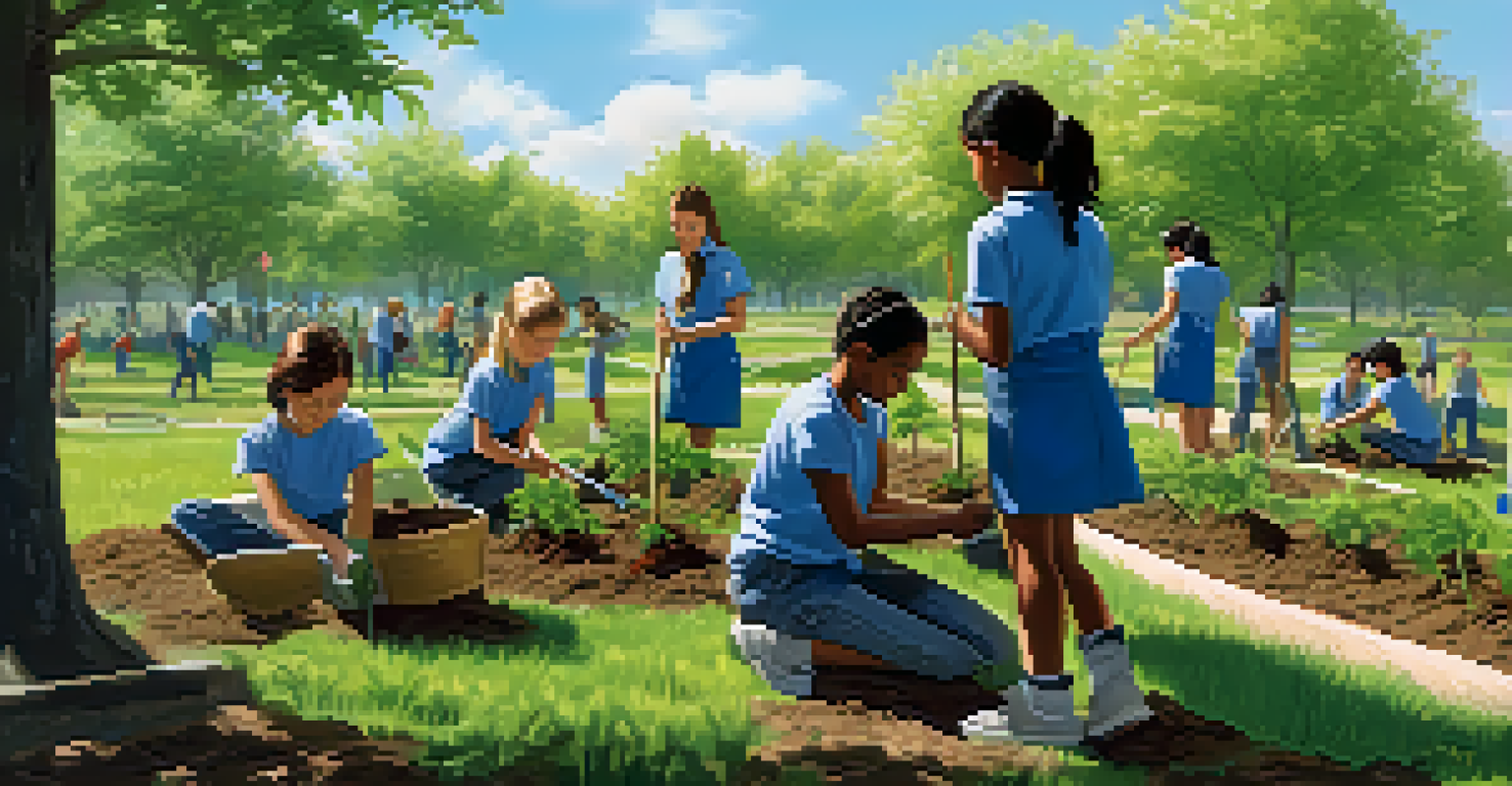Spiritual Development: A Critical Aspect of Student Growth

Defining Spiritual Development in Education
Spiritual development refers to the personal growth that helps students find meaning and purpose in life. It often encompasses beliefs, values, and a sense of connection to something greater than oneself. In an educational context, spiritual development plays a crucial role in shaping a student's character and ethical framework.
Education is not the filling of a pail, but the lighting of a fire.
By fostering spiritual awareness, educators can help students navigate their inner lives, encouraging them to ask profound questions about existence, morality, and their place in the world. This process often leads to increased empathy and a deeper understanding of diverse perspectives. Ultimately, it lays a foundation for lifelong personal development.
Moreover, spiritual development is not limited to religious beliefs; it can also encompass secular philosophies and practices that promote mindfulness and self-reflection. By integrating spiritual growth into the curriculum, schools can support holistic education that nurtures the mind, body, and spirit.
The Benefits of Spiritual Development for Students
Students who engage in spiritual development often experience enhanced emotional well-being and resilience. This growth can manifest as improved coping skills during challenging times, helping students navigate the stresses of academic life. By fostering a sense of inner peace, they become more equipped to handle failures and setbacks.

Additionally, spiritual development can lead to stronger interpersonal relationships. When students cultivate empathy and understanding, they are more likely to build positive connections with peers and teachers. This supportive environment not only enhances academic performance but also contributes to a harmonious school culture.
Spiritual Growth Enhances Well-being
Engaging in spiritual development fosters emotional resilience and improves coping skills in students.
Furthermore, students who explore their spirituality often develop a clearer sense of purpose. This clarity can guide their academic and career choices, leading to more fulfilling life paths. In essence, spiritual development empowers students to pursue their passions and contribute meaningfully to society.
Integrating Spiritual Development into Curriculum
Incorporating spiritual development into the curriculum can be achieved through various methods, such as reflective practices, discussions on ethics, and mindfulness activities. Teachers can create a space where students feel safe to explore their beliefs and values, encouraging open dialogue and respect for diversity. This approach fosters an inclusive environment conducive to spiritual growth.
The greatest use of a life is to spend it on something that will outlast it.
For instance, schools might offer courses or workshops that focus on topics like meditation, gratitude, or service to others. These activities not only promote personal reflection but also encourage students to engage with the community, reinforcing the idea that spiritual growth often involves service and connection to others.
Additionally, integrating literature that explores spiritual themes can spark meaningful conversations among students. By analyzing characters' journeys and moral dilemmas, students can gain insights into their own beliefs and values, promoting critical thinking and self-discovery.
Role of Educators in Spiritual Growth
Educators play a pivotal role in fostering spiritual development within their classrooms. By modeling openness and authenticity, teachers can encourage students to explore their spiritual journeys without fear of judgment. This supportive atmosphere is essential for personal growth and self-exploration.
Furthermore, educators can facilitate activities that promote self-reflection, such as journaling or group discussions. These practices allow students to articulate their thoughts and experiences, leading to deeper understanding and connection with themselves and others. A teacher's guidance can make a significant difference in how students approach their spiritual development.
Integrating Spirituality in Education
Incorporating spiritual practices into the curriculum promotes holistic education and encourages personal reflection.
Ultimately, educators should embrace their role as mentors in the spiritual growth process. By providing resources, encouraging exploration, and fostering a sense of community, they can help shape well-rounded individuals who are not only academically successful but also spiritually fulfilled.
Challenges in Promoting Spiritual Development
While promoting spiritual development is beneficial, it does come with challenges. One major obstacle is the diverse beliefs and values present in a classroom. Educators must navigate these differences with sensitivity, ensuring that all students feel respected and included in discussions about spirituality.
Additionally, there may be resistance from some parents or community members who believe that spiritual development is outside the school's purview. It's essential for schools to communicate the value of spiritual growth in a secular context, emphasizing its role in fostering emotional intelligence and ethical behavior.
Lastly, teachers may feel unprepared to address spiritual topics due to a lack of training. Providing professional development opportunities focused on spiritual growth can equip educators with the tools they need to facilitate these important conversations effectively.
Measuring Spiritual Development in Students
Measuring spiritual development can be challenging, as it often involves subjective experiences and personal beliefs. However, educators can utilize various assessment tools, such as reflective journals or self-assessment questionnaires, to gauge students' progress. These tools can provide valuable insights into how students perceive their spiritual growth.
Additionally, educators can observe changes in students' behavior and attitudes over time. For example, increased empathy, improved conflict resolution skills, and a greater sense of purpose can all indicate positive spiritual development. By tracking these changes, teachers can better understand the impact of their efforts.
Educators as Spiritual Mentors
Teachers play a crucial role in supporting students' spiritual journeys by fostering an open and inclusive classroom environment.
Ultimately, while spiritual development may not lend itself to traditional grading systems, its effects are evident in the overall well-being and growth of students. By focusing on holistic development, schools can create a nurturing environment that supports all aspects of a child's growth.
Encouraging Lifelong Spiritual Growth Beyond School
The journey of spiritual development doesn't end when students graduate; it's a lifelong process. Schools can play a crucial role in instilling the importance of continued spiritual exploration and self-reflection. Encouraging students to seek out experiences that promote growth, such as volunteering or joining community groups, can help them stay connected to their spiritual journeys.
Moreover, alumni programs can offer support and resources for former students as they navigate their post-school lives. These programs can foster a sense of community and encourage ongoing dialogue about spirituality, helping individuals remain engaged in their personal development.

Ultimately, by emphasizing the significance of spiritual growth during their educational journey, schools can help students carry these values into adulthood. This foundation will enable them to lead meaningful lives and contribute positively to society, no matter where their paths may take them.